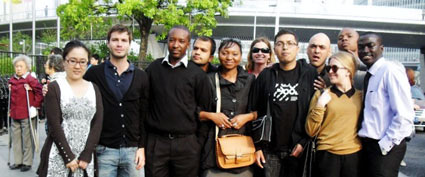Emerging Leaders Scholarship Programme
14-03-12
The Ministry of Foreign Affairs has decided to phase out the Emerging Leaders Scholarship Programme (ELSP) as from 2012. Two of the graduates, Veronica from South Africa and Enoch from Ghana, give their personal account of what the studies in Denmark have meant to them.
By Lene Mosegaard and Jan Kjær
31 year old Veronica Matheba is back in South Africa and 27 year old Enoch Yeboah Agyepong is back in Ghana. Both now hold a Masters degree thanks to the Emerging Leaders Scholarship Programme (ELSP).
And both have benefitted greatly from their scholarship in Denmark offered by the Ministry of Foreign Affairs and administered by Danida Fellowship Centre.
“It was a new learning curve altogether. The teaching style was different and it was inducing how to think independently in different situations. I loved it!” Veronica says.
And Enoch adds:
“I really wish the ELSP did not have to end but could continue for some time so as to offer other scholars such experience.”
To operate in a globalized world
The ESLP started in 2007. Consistent with Danish policy and priorities, funding was put aside over a five-year period for scholarships to assist selected entrepreneurs and emerging business leaders from Danida’s programme countries to take the full-time Master of Business Administration (MBA) at the Copenhagen Business School (CBS), the full-time Sustainable MBA at Aarhus School of Business, Aarhus University or the Master in Science in Agricultural Economics with a focus on agribusiness at University of Copenhagen.
Furthermore, DFC offers MBAs in South Africa at two internationally accredited Business Schools, namely the Gordon Institute of Business Science, University of Pretoria and Graduate School of Business, University of Cape Town.
The aim has been to assist suitable applicants to further develop the initiatives and the potential they would already have demonstrated, and to equip them to operate in the globalized economy.
ELSP scholars have followed the normal MBA or MSc curriculum together with classmates from Denmark and many other countries.
Most scholars from Africa
ELSP was intended to award the majority of its scholarships in Africa, where new jobs and generation of income are essential to sustainable development.
Particular focus has been placed on assisting women to overcome gender-based barriers which hamper their potential contribution to private sector growth.
The ELSP has been designed to contribute to Private Sector Development. Applicants have come from locally-owned private sector companies engaged in business management and entrepreneurship, the financial and banking sector including micro financing, business associations, legislative and regulatory bodies, and academic and training institutes contributing to private sector development.
Built in problems in programme set up
The programme has now ceased to be part of the DFC course schedule and no new scholars are invited to Denmark.
Despite the positive feedback from scholars such as Veronica and Enoch, DFC director Anne Christensen informs of hitches as well.
“There were some built in problems in the set up. Participants should obtain 10 per cent of the fee from other sources, but in fact we got a lot of young people financing it themselves, pushing their private economy to the limit,” Anne told the DFC Newsletter in September 2011.
Go back to our stories

